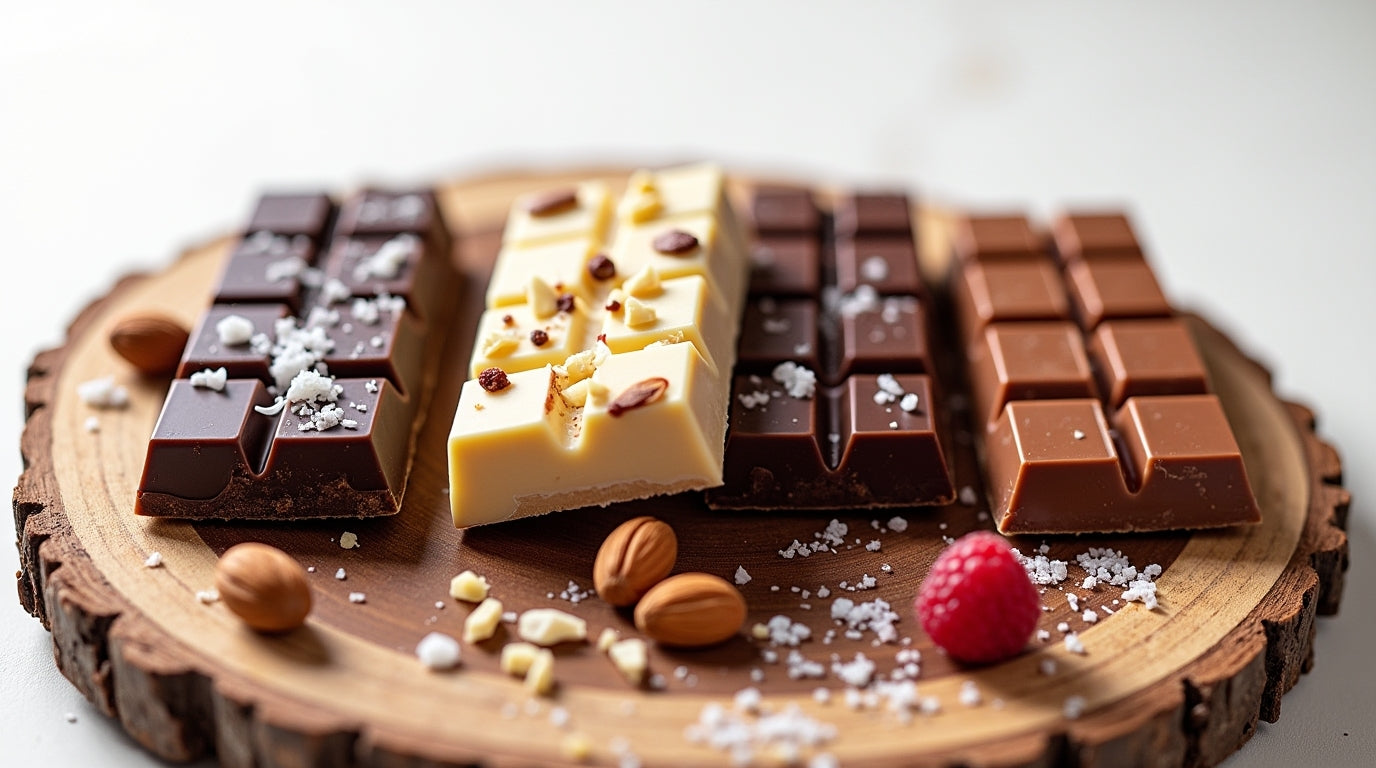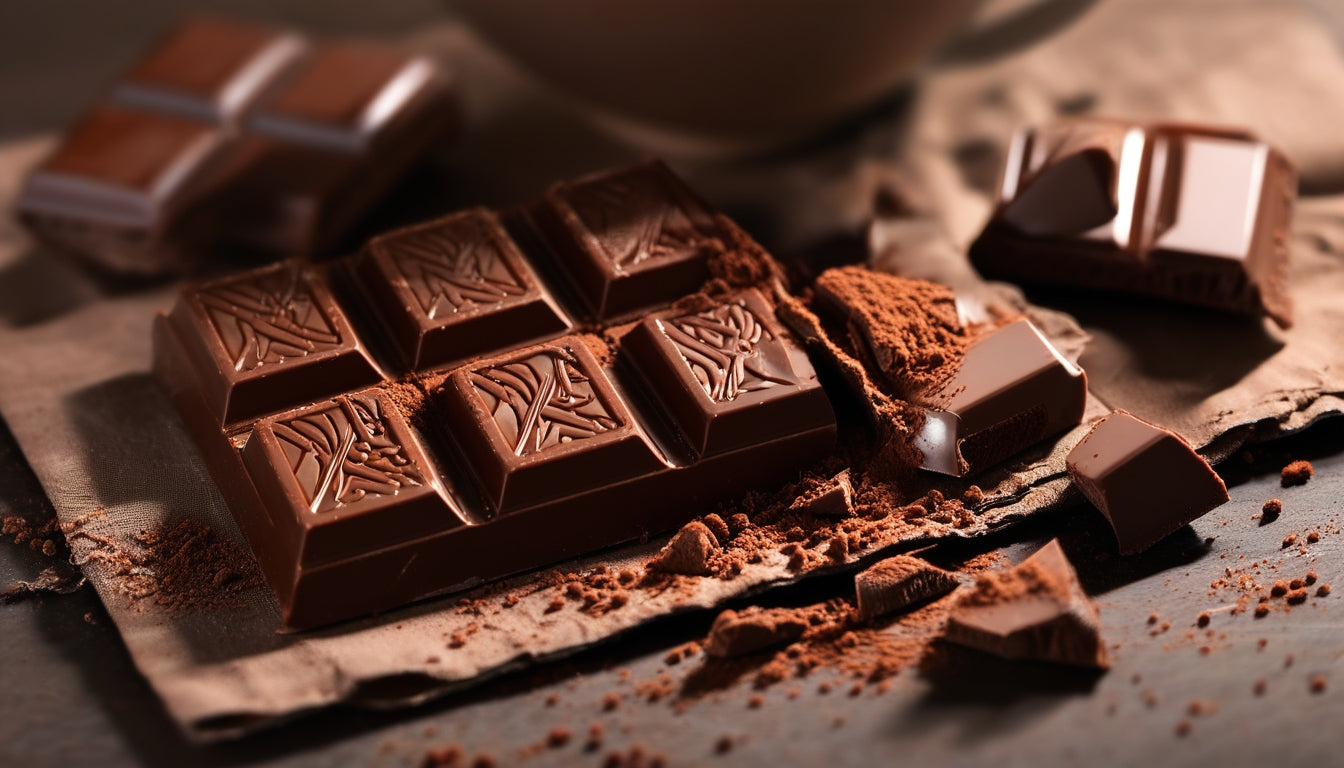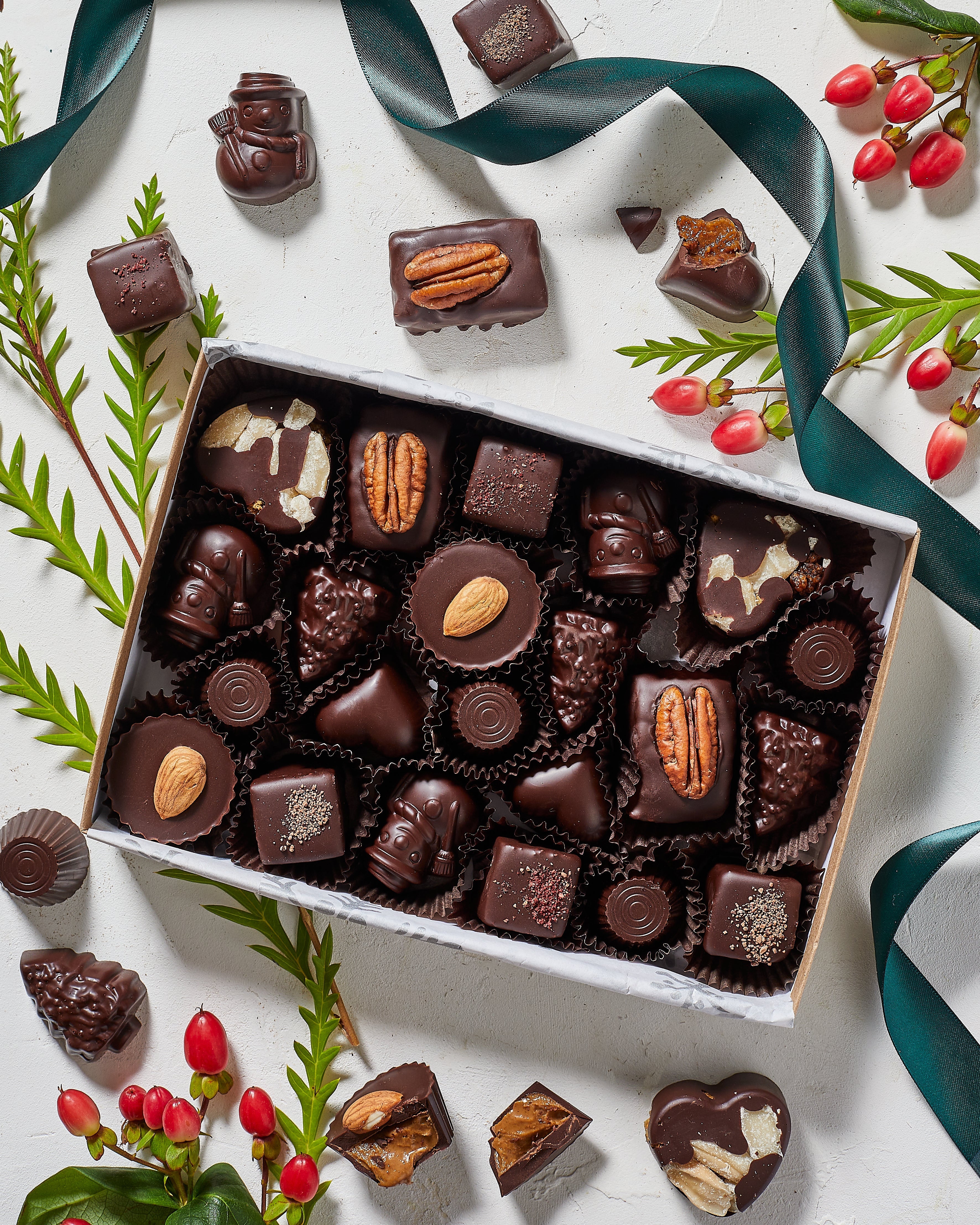
Types of Chocolate Bars: A Complete Guide to Artisanal and Conscious Indulgence
In a world where chocolate lovers are becoming increasingly conscious about what goes into their favorite treats, understanding the diverse landscape of chocolate bars has never been more important. From traditional milk chocolate bars to innovative plant-based creations, the chocolate bar universe offers something for every palate and preference. Let's explore the wonderful world of chocolate bars, with special attention to the artisanal, health-conscious options that are revolutionizing how we indulge.
Understanding Different Chocolate Bar Types
The Foundation: Chocolate Classifications
Before diving into specific varieties, it's important to understand the basic types of chocolate that form the foundation of most bars:
Dark Chocolate: Containing higher percentages of cocoa (typically 50-90%), dark chocolate offers a rich, sometimes bitter profile with less sugar and no milk solids. The higher the cocoa percentage, the more intense the chocolate flavor and potential health benefits.
Milk Chocolate: The most popular variety worldwide, milk chocolate combines cocoa solids with milk powder or condensed milk and sugar, creating a sweeter, creamier experience than dark chocolate.
White Chocolate: Technically not chocolate in the strictest sense as it contains no cocoa solids, white chocolate is made from cocoa butter, sugar, and milk solids, offering a sweet, vanilla-forward flavor profile.
Ruby Chocolate: A relatively recent innovation discovered in 2017, ruby chocolate has a natural pink color and distinct berry-like flavor profile derived from specific ruby cocoa beans.
Common Chocolate Bar Fillings and Mix-ins
What truly sets chocolate bars apart are their unique combinations of fillings and additions:
Nuts: From almonds and hazelnuts to peanuts and cashews, nuts add texture and nutritional value to chocolate bars.
Caramel: This sweet, gooey addition creates a delightful contrast to chocolate's firm texture.
Nougat: A chewy confection typically made from honey, sugar, and whipped egg whites, often combined with nuts or fruit.
Fruit: Dried fruits like cherries, raspberries, or exotic superfruits add tartness and nutritional benefits.
Crisped Rice: Adds a light, crunchy texture popular in many mainstream chocolate bars.
Cookie Pieces: Adds familiar comfort and crunch to chocolate bars.
Ethical and Health-Conscious Chocolate Bars
The modern chocolate industry has evolved to address growing consumer concerns about health, sustainability, and ethical sourcing. This has given rise to a new generation of chocolate bars that prioritize:
Vegan and Plant-Based Options
Vegan chocolate bars replace dairy ingredients with plant-based alternatives while maintaining the indulgent experience chocolate lovers crave. These bars typically use:
Coconut Milk/Cream: Creates a rich, creamy texture without dairy.
Almond Butter: Adds protein and a smooth mouthfeel.
Natural Sweeteners: Such as coconut sugar, which has a lower glycemic index than refined sugar.
Organic and Fair Trade Chocolate
Organic Certification: Ensures the cocoa and other ingredients are grown without synthetic pesticides or fertilizers.
Fair Trade Practices: Guarantees cocoa farmers receive fair compensation and encourages sustainable farming methods.
Direct Trade: Some chocolate makers work directly with cocoa farmers to ensure quality and ethical standards.
The Coracao Confections Difference

Among the pioneers in the ethical, health-conscious chocolate movement, Coracao Confections stands out for their commitment to creating chocolate bars that are as nourishing for the body as they are for the planet. Their approach represents the future of chocolate indulgence: conscious, clean, and incredibly delicious.
Signature Features of Coracao Chocolate Bars
What makes Coracao chocolate bars distinct in the crowded chocolate market?
1. 100% Plant-Based Ingredients: All Coracao chocolate bars are vegan, using no animal products whatsoever while still delivering rich, satisfying flavor profiles.
2. Organic, Fair-Trade Sourcing: Their commitment to sustainable agriculture ensures every chocolate bar supports both environmental health and the wellbeing of farming communities.
3. Refined Sugar-Free: Instead of processed sugars, Coracao uses natural sweeteners like coconut sugar, which provides a more balanced sweetness with a lower glycemic impact.
4. Free From Common Allergens: All Coracao chocolate bars are gluten-free, soy-free, dairy-free, and peanut-free, making them accessible to those with food sensitivities.
5. Nutrient-Dense Superfoods: Many of their bars incorporate functional ingredients like adaptogens and superfruits that offer benefits beyond mere indulgence.
Popular Coracao Chocolate Bar Varieties
The Berkeley Bar
The Berkeley Bar represents Coracao's innovative approach to reinventing classic favorites. This bar features:
- A chewy, adaptogenic maca and lucuma nougat layer
- Whipped cashew butter caramel
- Crunchy, salty almonds
- All enrobed in their signature 81% dark chocolate
Think of it as a conscious reinvention of popular candy bars, but with all-organic ingredients and no refined sugars, making it suitable for vegan and paleo lifestyles alike.
Almond Butter Chocolate Bar

The Almond Butter Chocolate Bar showcases Coracao's commitment to simple, clean ingredients that deliver maximum satisfaction. With stone-ground organic almond butter wrapped in rich dark chocolate, this bar offers a protein-rich treat that satisfies cravings without the sugar crash.
Superberry Chocolate Bars
For those seeking chocolate with functional benefits, Coracao's Superberry Chocolate Bars combine the antioxidant power of dark chocolate with superfruits like acai, raspberry, and pomegranate. This bar delivers not just incredible flavor but also a nutritional boost.
How to Choose the Right Chocolate Bar
With so many options available, selecting the perfect chocolate bar comes down to considering:
Flavor Preferences
- For traditional chocolate lovers: Dark chocolate bars with high cocoa percentages
- For those with a sweet tooth: Bars with natural sweeteners and fruit
- For texture enthusiasts: Bars with nuts or crunchy elements
Dietary Considerations
- Vegan/dairy-free: Plant-based bars like Coracao's entire line
- Low sugar: Bars sweetened with coconut sugar or other natural alternatives
- Allergen concerns: Bars specifically labeled as free from common allergens
Ethical Priorities
- Environmental impact: Bars from companies with sustainable practices
- Social responsibility: Fair trade certified or direct trade chocolate
- Local production: Supporting small-batch, local chocolate makers
How to Store and Savor Your Chocolate Bars
To fully appreciate fine chocolate bars, proper storage and mindful consumption are key:
Storage Best Practices
- Store between 65-70°F (18-21°C) in a dry place
- Keep away from strong odors as chocolate easily absorbs aromas
- Avoid refrigeration when possible, as it can cause sugar bloom and affect texture
The Art of Chocolate Tasting
- Look at the chocolate's appearance and color
- Smell the bar to detect aromatic notes
- Break a piece to hear the "snap" (good chocolate has a clean break)
- Let it melt on your tongue rather than chewing
- Notice how the flavors develop and change as the chocolate melts
Beyond the Bar: Creative Ways to Enjoy Chocolate
Quality chocolate bars can elevate your culinary experiences beyond simple snacking:
Cooking Applications
- Chop premium bars into cookies or brownies
- Melt for dipping fruits or making homemade chocolate-covered nuts
- Create decadent chocolate ganache for cakes or truffles
Pairing Suggestions
- Dark chocolate with red wine or espresso
- Fruit-infused bars with herbal teas
- Nut-based bars with craft beer
Conclusion: The Future of Chocolate Bars
As consumers become increasingly conscious about health, sustainability, and ethical consumption, the chocolate bar industry continues to evolve. Brands like Coracao Confections are leading this evolution, proving that chocolate can be both a guilt-free pleasure and a force for positive change.
Whether you're a chocolate connoisseur or simply someone who enjoys an occasional sweet treat, today's diverse chocolate bar landscape offers more options than ever to satisfy your cravings mindfully. From classic dark chocolate to innovative superfood-infused creations, there's a chocolate bar out there that perfectly aligns with your taste preferences and values.
The next time you reach for a chocolate bar, consider choosing one that not only satisfies your taste buds but also supports your health goals and reflects your values. With companies like Coracao Confections transforming how we think about chocolate, indulgence has never been so conscientious.
Frequently Asked Questions About Chocolate Bars
Q: Are dark chocolate bars healthier than milk chocolate?
A: Dark chocolate typically contains more cocoa and less sugar than milk chocolate, providing more antioxidants and potential health benefits. However, quality and processing methods matter too.
Q: How can I tell if a chocolate bar is high quality?
A: Look for bars with simple, recognizable ingredients, proper tempering (shown by a glossy appearance and clean snap), and bars that feel smooth, not grainy, when they melt.
Q: Can vegan chocolate bars taste as good as traditional ones?
A: Absolutely! Companies like Coracao Confections prove that plant-based ingredients can create chocolate bars that are every bit as delicious—and often more nutritionally balanced—than conventional options.
Q: How long do chocolate bars last?
A: Properly stored, dark chocolate bars can last up to two years, while milk and white chocolate have a shorter shelf life of about a year. Bars with fillings typically have the shortest shelf life.
Q: Are chocolate bars with nuts more nutritious?
A: Nut-containing chocolate bars often provide additional protein, healthy fats, and fiber, making them more satiating and nutritionally balanced than plain chocolate.

Claire Bennett
I'm Claire, a chocolate lover and artisan based in a small town where I run a tiny home kitchen dedicated to exploring everything chocolate. From single-origin dark bars to creamy ganache and handmade truffles, I find joy in working with all types of chocolate. I believe chocolate has a story, and I love bringing that story to life through humble, heartfelt creations.



Leave a comment
This site is protected by hCaptcha and the hCaptcha Privacy Policy and Terms of Service apply.